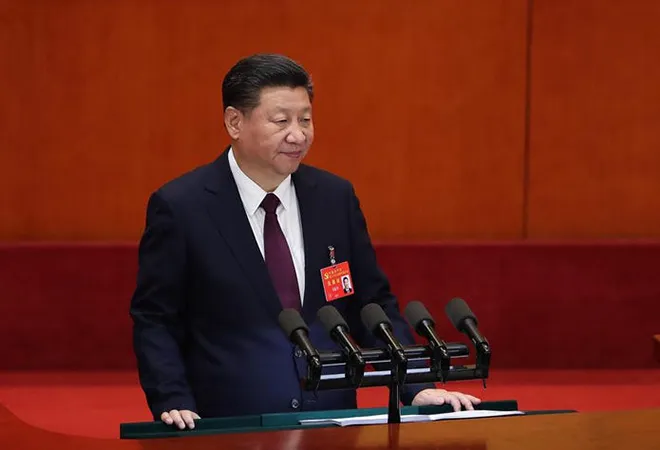< lang="EN-US">In a truly imperious manner, Xi Jinping has made it clear that he has no intention of going back on, let alone rethink, key strands of his doctrine. From the zero-Covid policy and Taiwan to his anti-graft campaign and push to “Sinicise religion,” his verdict is clear. He intends to continue on the path he believes will take his nation to assume its manifest destiny. In the Great Hall of the People, in front of 2,300 hand-picked delegates, Xi addressed the Communist Party Congress for nearly two hours. As he enters an almost assured third term, he stands in the league of greats such as Mao Zedong and, therefore, has no real need to reflect. Instead, his project — the “great rejuvenation of the Chinese nation” — will continue to be the focus for the next five years as he seeks to cement his legacy.
< lang="EN-US">Nothing matters more to the leadership and, in particular, to Xi than Taiwan. He got the maximum applause when he said, “The wheels of history are rolling on toward China’s reunification and the rejuvenation of the Chinese nation. Complete reunification of our country must be realised, and it can, without doubt, be realised.” He came to this issue early on in his speech, perhaps underlining the immediacy with which he views this. That Xi is unlikely to brook any dissent on this issue was made clear when he suggested that “in the face of serious provocations by the Taiwan independence separatists and the interference of external force, we resolutely carried out major struggles against separatism and interference, demonstrating our firm determination and strong ability to safeguard national sovereignty and territorial integrity and oppose Taiwan independence force.”
Given the recent tensions in the Taiwan Strait, it is striking how central Taiwan has become to China’s global identity, both in domestic and foreign policy.
< lang="EN-US">And, to ensure that his message is not lost on Taipei and its supporters, Xi asserted that though he would “continue to strive for peaceful reunification”, Beijing will “never promise to renounce the use of force”. Given the recent tensions in the Taiwan Strait, it is striking how central Taiwan has become to China’s global identity, both in domestic and foreign policy. With the spotlight on Taiwan, Xi is not only trying to mobilise domestic political support for a more assertive Taiwan policy but also making it difficult for himself to wriggle out of a potential crisis.
< lang="EN-US">The Chinese military, Xi has reminded the world often enough, has the determination and prowess to repel external support for Taiwan. But it is now increasingly clear that Xi is getting restless. The message from the Party Congress is clear — there will be an intensification of pressure on Taiwan as Beijing seeks to break the morale of the Taiwanese people. Taipei has reacted strongly by suggesting that “Taiwan’s position is firm: no backing down on national sovereignty, no compromise on democracy and freedom, and meeting on the battlefield is absolutely not an option for the two sides of the Taiwan Strait”. Interestingly, Taiwan premier Su Tseng-chang also pointedly remarked that “Xi Jinping should pay attention to the smoke and protest banners on the Sitong Bridge in Beijing, rather than always thinking about using force to deal with Taiwan.” He was referring to the protester who mounted Sitong bridge in the Haidian district of Beijing, with two large banners calling for an end to China’s stringent zero-Covid policy and the overthrow of Xi.
Taiwan premier Su Tseng-chang also pointedly remarked that “Xi Jinping should pay attention to the smoke and protest banners on the Sitong Bridge in Beijing, rather than always thinking about using force to deal with Taiwan.”
< lang="EN-US">Cross-strait relations are passing through one of the most turbulent phases as the CCP realises time might be running out for “peaceful reunification.” Taiwan is undergoing a generational change in attitude, and more hard-line responses from Beijing are widening the distance between the mainland and Taiwan. Though Xi was almost euphoric in suggesting that “one country, two systems” has proven to be the best institutional mechanism for Hong Kong and Macau, no one in Taiwan will be wishing the fate of Hong Kong on themselves.
< lang="EN-US">Xi has sounded the bugle that Taiwan will continue to be the most important fault line in his global engagement. The rest of the world, including India, must assess the implications of this development with a degree of seriousness. Beijing’s policy toward Taiwan is symptomatic of a wider problem: Xi’s imperialist tendencies. His desire to unilaterally change the status quo is not restricted to Taiwan. It’s just the most visible manifestation of his imperialist fantasy. India, South and East China seas are also not far behind. Greater solidarity with Taiwan is the need of the hour.
This commentary originally appeared in Hindustan Times.
The views expressed above belong to the author(s). ORF research and analyses now available on Telegram! Click here to access our curated content — blogs, longforms and interviews.




 PREV
PREV


